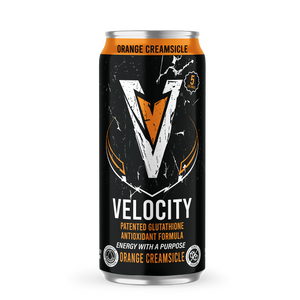Glutathione is your body’s “master antioxidant,” protecting your cells, boosting immunity, and aiding detoxification. It’s made from three amino acids - cysteine, glutamate, and glycine - and helps repair damage from stress, pollution, and toxins. Low levels are linked to aging, chronic diseases, and fatigue. Here’s what you need to know:
- Key Benefits: Fights oxidative stress, supports immune function, detoxifies the liver, and aids in cellular repair.
-
How to Boost Levels:
- Diet: Eat sulfur-rich foods (broccoli, garlic), vitamin C sources (citrus, strawberries), and selenium-rich foods (Brazil nuts, fish).
- Supplements: Consider N-acetylcysteine (NAC), liposomal glutathione, or oral glutathione.
- Lifestyle: Exercise, manage stress, get 7–9 hours of sleep, and limit alcohol/toxin exposure.
Maintaining glutathione levels is essential for energy, mental clarity, and long-term health. Ready to learn how it works and how to increase it? Let’s dive in.
Key Health Benefits of Glutathione
Glutathione is a powerful compound that not only shields your cells but also supports energy levels, mental clarity, and overall resilience.
Protection Against Oxidative Stress
Oxidative stress happens when free radicals overwhelm your body’s defenses, damaging healthy cells in the process. Think of free radicals as troublemakers and glutathione as your body’s internal security team, neutralizing these harmful agents. It acts as a quick-response reservoir of reducing power, helping cells defend themselves against oxidative damage. High oxidative stress is linked to conditions like diabetes, cancer, and arthritis. What makes glutathione stand out is its widespread presence - found in high concentrations in nearly every cell in your body. This widespread availability strengthens its role in bolstering immune defenses.
Improved Immune Function
Glutathione is essential for a fully functioning immune system. It plays a key role in supporting T-cell lymphocytes, a type of white blood cell that acts as the first line of defense in your immune response. Glutathione increases T-cell numbers and helps maintain normal cytokine levels, which are crucial for coordinating immune activity. Without glutathione, T cells can activate but cannot replicate effectively.
"Glutathione helps strengthen your immune system in two important ways. First of all, it plays a central role in the proper functioning of T-cell lymphocytes (white blood cells), the frontline of the immune system, by increasing their number."
The practical benefits of this immune support are clear. For example, a clinical trial found that 66% of children with chronic ear infections experienced marked improvement after receiving nasal glutathione treatments for two weeks. Beyond immunity, glutathione is a key player in detoxifying your body - a process that’s more critical than ever in today’s toxin-heavy world.
Detoxification Support
Your liver is your body’s detox powerhouse, and glutathione plays a crucial role in this process. It helps break down harmful substances, reduces inflammation, and supports the liver’s detoxification efforts. With increasing exposure to pollutants and heavy metals, having an efficient detox system is more important than ever.
"Glutathione is the mother of all antioxidants, the master detoxifier and maestro of the immune system." -
Mark Hyman, Doctor
By aiding in toxin elimination, glutathione allows your body to conserve energy for other essential functions.
Cellular Repair and Recovery
Glutathione also supports cellular repair and energy production. It works at the cellular level to restore your body’s natural ability to heal itself and keeps mitochondria - the energy-producing centers of cells - functioning optimally. By maintaining mitochondrial health, glutathione ensures steady ATP production, the energy currency your body depends on.
In addition, glutathione is vital for brain health, as it neutralizes free radicals that can impair mental clarity. Low glutathione levels have been tied to fatigue, muscle weakness, and mental fog. Research published in the journal Biochemistry even suggests that glutathione can stop DNA-damaging free radicals before they cause harm, protecting your genetic material. Studies also show that individuals with neurodegenerative diseases like Alzheimer’s and Parkinson’s often have lower glutathione levels, particularly in critical areas like the hippocampus.
When glutathione levels are optimized, the effects can feel transformative:
"It removes the sluggishness, like taking a wet blanket off your body."
- Nayan Patel, Pharm.D.
This continuous process of cellular repair and recovery underscores why maintaining healthy glutathione levels is so important. It’s not just about preventing illness - it’s about helping your body perform, heal, and recover at its best every single day.
How to Boost Glutathione Levels Naturally
Glutathione plays a crucial role in maintaining your health, aiding in detoxification, immunity, and cellular repair. Fortunately, there are several practical ways to naturally increase your body's glutathione levels. By making thoughtful food choices, considering specific supplements, and adopting healthy lifestyle habits, you can support your body's ability to produce this important antioxidant.
Diet and Food Choices
One of the easiest ways to support glutathione production is through your diet. Foods rich in sulfur provide the essential building blocks - cysteine, glutamate, and glycine - needed for glutathione synthesis. Consider adding these to your meals:
- Cruciferous vegetables: Broccoli, Brussels sprouts, cauliflower, kale, and watercress. Regular consumption of these vegetables could boost glutathione levels by up to 30%.
- Protein sources: Beef, fish, and poultry are excellent options.
- Garlic, onions, and shallots: These sulfur-rich foods are easy to incorporate. Try adding minced garlic to your dishes or tossing raw onions into a salad for a flavorful boost.
Vitamin C also plays a significant role in glutathione production. Consuming 500–1,000 mg of vitamin C daily can increase glutathione levels in your blood cells. Foods like strawberries, citrus fruits, papayas, kiwis, and bell peppers are great sources of this vitamin.
Selenium is another key nutrient. Include selenium-rich foods such as Brazil nuts, organ meats, cottage cheese, brown rice, chicken, and fish in your diet. Selenium supplements have even been shown to raise glutathione peroxidase levels, which is particularly useful for those with kidney issues.
Additionally, foods like spinach, avocados, asparagus, and okra contain glutathione directly. Although dietary glutathione isn't absorbed efficiently, these foods still help combat oxidative stress.
Cooking tip: High-heat cooking methods can reduce glutathione content in foods by as much as 60%. To preserve their benefits, try steaming, sautéing at lower temperatures, or eating some of these foods raw.
Supplement Options
If dietary changes alone don't suffice, supplements can provide a more direct way to boost glutathione levels. However, not all supplements are equally effective, as absorption can vary.
- Liposomal or sublingual glutathione: These forms bypass stomach acids, making them more effective at raising glutathione levels.
- Oral glutathione: Taking 250–1,000 mg daily has been shown to increase levels by 30–35%, though the benefits may taper off after discontinuation.
- N-acetylcysteine (NAC): This supplement supplies cysteine, which your body uses to produce glutathione naturally.
When selecting supplements, look for products with United States Pharmacopeia (USP) verification and buy from trusted brands. Since the FDA does not regulate glutathione supplements, quality can vary. Some formulations also include vitamin C, which works in tandem with glutathione. Always consult your healthcare provider before starting any new supplement, especially if you have pre-existing health conditions or take medications.
Lifestyle Changes
Diet and supplements are just part of the equation. Making certain lifestyle adjustments can also encourage your body to produce more glutathione:
- Exercise regularly: Physical activity helps reduce oxidative stress, which supports glutathione production.
- Practice stress management: Long-term stress can deplete your glutathione levels. Activities like yoga have been shown to significantly increase glutathione levels over time.
- Prioritize sleep: Your body performs much of its repair work, including glutathione synthesis, while you sleep. Aim for 7–9 hours of quality sleep each night.
- Minimize toxin exposure: Toxins like cigarette smoke, environmental chemicals, and alcohol can deplete glutathione. Reduce exposure by choosing organic produce when possible, using natural cleaning products, and filtering your drinking water.
sbb-itb-b96d45f
The Velocity Energy Advantage

Maintaining optimal glutathione levels can be challenging, but Velocity Energy offers a science-driven solution for clean, sustained energy. Its unique formula combines glutathione with other functional ingredients to promote cellular health. By building on the established benefits of glutathione, Velocity Energy brings practical wellness to your daily routine.
Patented Glutathione Formula
At the heart of Velocity Energy is a patented glutathione formula designed to meet your body's essential needs. Instead of depending on caffeine or artificial stimulants, this formula leverages glutathione - often called the body's "master antioxidant." Studies show that liposomal glutathione can boost levels, lower oxidative stress, and strengthen immune function. For instance, one study found that it increased NK (natural killer) cell activity by 400% and lymphocyte proliferation by 60% within just two weeks. This approach aligns perfectly with the goal of naturally enhancing your body’s antioxidant defenses.
As Joseph Lopez of AZIVM explains:
"Unlike other antioxidants that must be consumed, glutathione is produced by every cell in your body, highlighting its critical importance for cellular health. Its powerful antioxidant properties help neutralize free radicals, reduce oxidative stress, and support your body's natural detoxification processes.”
Energy and Wellness Benefits
Velocity Energy offers more than just an advanced formula - it delivers real benefits for energy and overall wellness. Designed to enhance mental clarity, strengthen immunity, and provide steady energy throughout the day[16], this formula helps your body produce energy more efficiently. By avoiding intravenous methods, Velocity Energy ensures maximum absorption and effectiveness in a convenient format. Research also suggests that low glutathione levels can increase the risk of illness during flu season by up to 50%.
Set to launch at the Purist Health Fair on July 11, 2025, Velocity Energy represents a breakthrough for those seeking a clean, science-based way to support cellular health and maintain balanced energy. For anyone dedicated to a wellness-focused lifestyle, this product offers a practical alternative to energy solutions that rely heavily on stimulants.
Practical Tips for Maintaining Optimal Glutathione Levels
Keeping your glutathione levels in check involves a mix of smart dietary choices, thoughtful supplementation, and lifestyle tweaks. The goal? Building habits that naturally support your body’s glutathione production while cutting down on things that drain it.
Following a Balanced Diet
What you eat has a big impact on your glutathione levels. Start by focusing on sulfur-rich foods like cruciferous veggies (think broccoli, cauliflower, and Brussels sprouts) and allium vegetables (garlic, onions, etc.), along with high-quality proteins. These foods provide the amino acids your body needs to produce glutathione[20].
Add selenium-rich foods to your plate, such as Brazil nuts, brown rice, beef, chicken, and fish. For an extra boost, include vitamin C-packed fruits like strawberries, oranges, kiwis, and bell peppers. Research suggests that taking 500–1,000 mg of vitamin C daily for 13 weeks can increase glutathione levels in white blood cells by 18%.
Broccoli sprouts are another great option - they’ve been shown to reduce oxidative stress in people with type 2 diabetes. And when cooking your veggies, stick to gentle methods like steaming or light sautéing. Regularly eating cruciferous vegetables may even boost glutathione levels by up to 30%[11].
Diet alone might not always be enough, though. That’s where supplements come in.
Using Supplements Properly
If you’re considering glutathione supplements, start small - 100 to 250 mg daily - and slowly increase the dose over 2–4 weeks to let your body adjust[21]. Always check with a healthcare provider before starting, as glutathione isn’t easily absorbed through the digestive system[22].
Look for supplements with better absorption, like liposomal or sublingual forms, rather than standard oral tablets. Be mindful of long-term use, as it could potentially lower zinc levels.
On top of adding supplements, avoid things that can drain your glutathione reserves. Limit alcohol, steer clear of cigarette smoke, and be cautious with acetaminophen, heavy metals, and nitrates. Together, a strong diet and smart supplementation can help maintain a healthy antioxidant balance.
Monitoring Personal Health Factors
Your lifestyle choices also play a huge role in keeping glutathione levels steady. Factors like aging, stress, and toxin exposure can deplete glutathione[21]. Prioritize getting 7–9 hours of good-quality sleep, as poor sleep can significantly reduce glutathione activity.
"Adjusting lifestyle habits like sleep hygiene, nutrition, and getting regular exercise can significantly boost glutathione production in your body."
– Brooke Diaz, Health & Wellness Writer.
Exercise is another game-changer. A 2014 study found that older adults who stayed active throughout their lives had higher glutathione levels. Even sedentary adults saw a boost in glutathione after starting exercise, though younger individuals experienced the biggest benefits. Incorporate both cardio and strength training into your routine for the best results.
Stress management is equally important. Chronic stress can drain glutathione, so try techniques like deep breathing, spending time outdoors, or light physical activity.
Lastly, keep an eye on alcohol consumption. Research shows that excessive drinking can slash lung glutathione levels by 80–90%. Since healthy lungs hold up to 1,000 times more glutathione than other tissues, cutting back on alcohol is key to protecting this vital antioxidant.
Conclusion
Glutathione plays a crucial role in combating oxidative stress and promoting overall health. This antioxidant not only protects your cells but also aids in detoxification, boosts immunity, and supports energy production. Studies suggest that maintaining optimal glutathione levels can lead to sharper mental focus, a stronger immune system, and consistent energy throughout the day.
When glutathione levels drop, your well-being can take a hit. Reduced levels are linked to lower energy, higher vulnerability to illness, and even cognitive challenges. For instance, individuals with chronic fatigue often have glutathione levels nearly 50% lower than those in better health, and diminished levels have been tied to a 20% reduction in memory retention performance.
Thankfully, there are practical ways to naturally boost your glutathione levels. Adding sulfur-rich foods like broccoli and garlic to your meals, along with supplements such as N-acetylcysteine or liposomal glutathione, can strengthen your body’s antioxidant defenses. Vitamin C is another effective option, shown to increase glutathione levels in white blood cells. These strategies lay the foundation for advanced solutions, like Velocity Energy’s patented formula.
For a science-backed approach, Velocity Energy’s glutathione formula offers unique benefits. It enhances mitochondrial function, protects cells, neutralizes toxins, and supports immune health, all while promoting natural energy production.
"Keeping your glutathione levels up is one of the best steps you can take for long-term health and vitality. It's like providing your cells with a natural defense system to fight fatigue, support immunity, and slow the signs of aging."
– Daniel G. Amen, MD
Whether you choose dietary changes, targeted supplements, or cutting-edge options like Velocity Energy, the key is consistency. By prioritizing your glutathione levels, you’re taking a significant step toward better energy, sharper focus, and improved overall wellness.
FAQs
What is glutathione, and how does it support liver health and detoxification?
Glutathione is a key antioxidant that plays a crucial role in helping the liver detoxify the body. It supports the liver's phase 1 and phase 2 detoxification processes, which involve breaking down toxins and making them easier for the body to eliminate.
In simpler terms, glutathione acts like a shield for liver cells, neutralizing free radicals and reducing oxidative stress. This protection helps prevent liver damage, making it especially helpful for people dealing with conditions like fatty liver disease or those exposed to harmful substances. By promoting liver health, glutathione supports overall well-being and strengthens the body's ability to handle environmental challenges.
What foods are rich in glutathione, and how does cooking impact its levels?
Foods naturally packed with glutathione include a variety of fruits, such as strawberries and avocados, along with vegetables like broccoli, kale, garlic, tomatoes, and green asparagus. Almonds are another great option to consider. Incorporating these into your meals can help support your glutathione levels.
How you prepare these foods matters too. High-heat cooking methods - like baking, grilling, or frying - can deplete their glutathione content. On the other hand, gentler approaches, such as steaming or lightly sautéing, help maintain it. To get the most out of these foods, aim to enjoy them raw, steamed, or only lightly cooked to preserve their nutrients.
What are some simple ways to naturally boost glutathione levels and support your health?
You can naturally support your glutathione levels by making a few simple lifestyle adjustments. Start by incorporating sulfur-rich foods like broccoli, garlic, and onions into your meals. Also, include foods packed with vitamins C and E, such as citrus fruits, spinach, and almonds. Don’t forget to add selenium-rich options like Brazil nuts, fish, and eggs to your diet - they can make a big difference.
Beyond your diet, regular moderate exercise and prioritizing good sleep habits are key. These habits not only promote healthy glutathione production but also boost your overall energy, well-being, and ability to combat oxidative stress.



